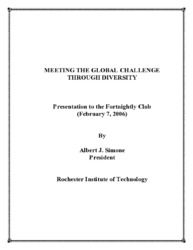| dc.description.abstract | In what follows, we shall describe some of the key challenges facing the United
States at this time. We shall cite some general macro economic statistics which describe
the U.S. economy over time and in relationship to other countries. The economic
challenges we cite are cause for alarm.
We shall also speak to some of the data which describe the general status of
education – at the K through 12 and university levels – in this country. Again, there is a
significant case for alarm.
The economic discussion points to a problem that threatens our quality of life,
standard of living, and, ultimately, even our democracy. The discussion around
education is important because, as I shall argue in a later section of this paper, it is the
key to meeting the challenge.
The solution, however, is not just to have more people better educated in particular
disciplines. Rather, it is creating a system and changing the culture so that a particular
segment of our population – namely, women and minorities (especially women) –
become more fully engaged in specific academic disciplines which lead to expertise in
particular professions. | en_US |

